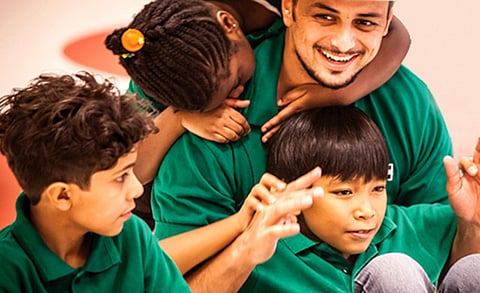ADFF: ‘As One: The Autism Project’ rocks
UAE-filmed documentary about 10 children with autism has audience cheering, crying

Can a documentary on a serious topic such as autism create a concert-like atmosphere and give birth to groupies? That question was answered after the screening of uplifting documentary As One: The Autism Project at the Abu Dhabi Film Festival on Saturday.
Cheering, clapping, smiling and sniffles from the audience accompanied the attempts of ten autistic children, of different verbal and emotional abilities, to put on a musical comedy.
Ten children, ten sets of parents and 12 weeks of their lives were captured in a rewarding and gripping 80 minutes; the will-they-or-won’t-they-perform was a climax worthy of a thriller, not a documentary.
“I am just overwhelmed and inspired by the whole project and how dedicated the parents and children were. To see what theatre, patience [and] commitment can do to these children was amazing. The message that this film will send to a lot of parents, to children, to educators is priceless,” said viewer Victoria Amador, dabbing tears.
The film, co-directed and produced by Hana Makki, overturns the conventional rules surrounding documentaries. It was never grim and was a perfect example of bright and cheery infotainment. Questions such as “how can I tell if my child has autism?”, “what should I do” and “how should society treat autistic children?” are addressed without being painfully didactic.
As comedian Mina Liccone, one of the teachers in charge of bringing out the funny bone in the kids, put it: “The families and children were so honest in what they shared. Being that open is changing lives and will help other people... I learnt way more from these kids than they with me.”
Apart from being patient and understanding, she embraced this project by getting to know each child individually rather than as a group. It worked. In less than two hours, the audience are not just acquainted with cherubic five-year-old Asher Boog Thompson or 14-year-old Ethiopian Mohammad Jawhar Mohammad Dawood’s killer memory, but are rooting for them to succeed on the big performance night. While dramatic, the documentary doesn’t gloss over the difficulties that families with autistic children face, nor does it make victims of them. The personalities of these little stars shone through — warts and all.
“The aim and goal of the movie is to show that it’s fine if your child has autism. He can learn and can be a part of society. We don’t want to change them but just teach them,” said Sharifa Yateem, the autism expert in the film.
For the parents who feature in the documentary, it was the most glorious moments of their lives. According to them, a film festival that attracts people of different colours and faiths was the perfect platform to spread awareness about autism.
“Our story is a story of hope and is proof that you can recover from something if you have early intervention and have people who are knowledgeable, caring around you,” said Kera Thompson, mother of Asher, the youngest child in the documentary, who has now joined a mainstream school in the US.
“When you first get a diagnosis like autism, you try to change and fix the child. The label drops on you like a bomb, but then you realise that he’s the same kid as before he got the diagnosis. The feeling that he is still your child and will love him regardless will exist. We wanted to bring joy in his world and him to join ours. There’s a recipe for that. It’s just about bringing the best in them.” As One: The Autism Project couldn’t have conveyed that more beautifully.
Did you know?
ImageNation is working on another documentary, Every Last Child, that highlights the polio eradication programme in Pakistan. It will be showcased at the New York Film Festival in November, said Michael Garin, CEO of Imagenation, on the red carpet.
Quote/Unquote:
“It was a challenge finding a girl because autism affects boys five times more. Gaby didn’t join us until the last couple of weeks of the show,” said Dana Dajani, casting and theatre director.



